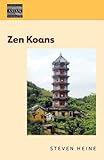Zen Koans / Steven Heine; ed. by Douglas Berger.
Material type: TextSeries: Dimensions of Asian Spirituality ; 20Publisher: Honolulu : University of Hawaii Press, [2014]Copyright date: ©2014Description: 1 online resource (224 p.) : 8 b&w imagesContent type:
TextSeries: Dimensions of Asian Spirituality ; 20Publisher: Honolulu : University of Hawaii Press, [2014]Copyright date: ©2014Description: 1 online resource (224 p.) : 8 b&w imagesContent type: - 9780824839734
- 9780824847906
- 294.3443 23
- online - DeGruyter
- Issued also in print.
| Item type | Current library | Call number | URL | Status | Notes | Barcode | |
|---|---|---|---|---|---|---|---|
 eBook
eBook
|
Biblioteca "Angelicum" Pont. Univ. S.Tommaso d'Aquino Nuvola online | online - DeGruyter (Browse shelf(Opens below)) | Online access | Not for loan (Accesso limitato) | Accesso per gli utenti autorizzati / Access for authorized users | (dgr)9780824847906 |
Frontmatter -- Contents -- Editor's Preface -- Acknowledgments -- Introduction: The Koan Is My Koan -- 1. Origins, Functions, and Modern Receptions of Koans: Classic and Contemporary Perspectives -- 2. Developmental Stages and Rhetorical Strategies: A Historical Overview -- 3. On Methods to the Madness of Koans: A New Theory of Interpretation -- 4. Personal Transformation: Cases Reflecting Doubt, Experience, and Expression -- 5. Monastic Transmission: Cases Reflecting Mythology, Monasticism, and Succession -- 6. Whither Koans, or Wither? Current Trends and Possible New Directions -- Appendix: Koan Case Catalog -- Suggested Readings -- About the Author
restricted access online access with authorization star
http://purl.org/coar/access_right/c_16ec
"What is the sound of one hand clapping?" "Does a dog have Buddha-nature?" These cryptic expressions are among the best-known examples of koans, the confusing, often contradictory sayings that form the centerpiece of Zen Buddhist learning and training. Viewed as an ideal method for attaining and transmitting an unimpeded experience of enlightenment, they became the main object of study in Zen meditation, where their contemplation was meant to exhaust the capacity of the rational mind and the expressiveness of speech. Koan compilations, which include elegant poetic and eloquent prose commentaries on cryptic dialogues, are part of a great literary tradition in China, Japan, and Korea that appealed to intellectuals who sought spiritual fulfillment through interpreting elaborate rhetoric related to mysterious metaphysical exchanges.In this compact volume, Steven Heine, who has written extensively on Zen Buddhism and koans, introduces and analyzes the classic background of texts and rites and explores the contemporary significance of koans to illuminate the full implications of this ongoing tradition. He delves deeply into the inner structure of koan literature to uncover and interpret profound levels of metaphorical significance. At the same time, he takes the reader beyond the veil of vagueness and inscrutability to an understanding of how koan writings have been used in pre-modern East Asia and are coming to be evoked and implemented in modern American practice of Zen. By focusing on two main facets of the religious themes expressed in koan records-individual religious attainment and the role dialogues play in maintaining order in the monastic system-Zen Koans reveals the distinct yet interlocking levels of meaning reflected in different koan case records and helps make sense of the seemingly nonsensical. It is a book for anyone interested in untangling the web of words used in Zen exchanges and exploring their important place in the vast creative wellspring of East Asian religion and culture.
Issued also in print.
Mode of access: Internet via World Wide Web.
In English.
Description based on online resource; title from PDF title page (publisher's Web site, viewed 02. Mrz 2022)


